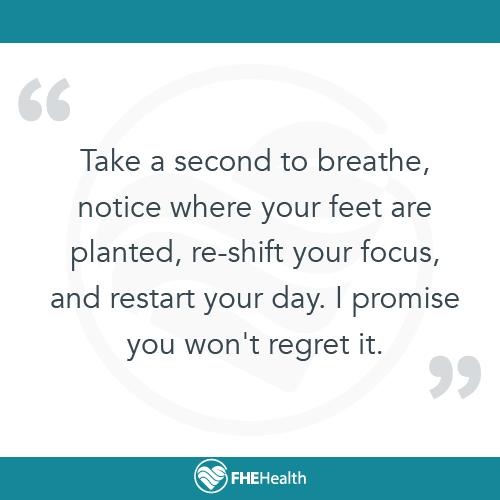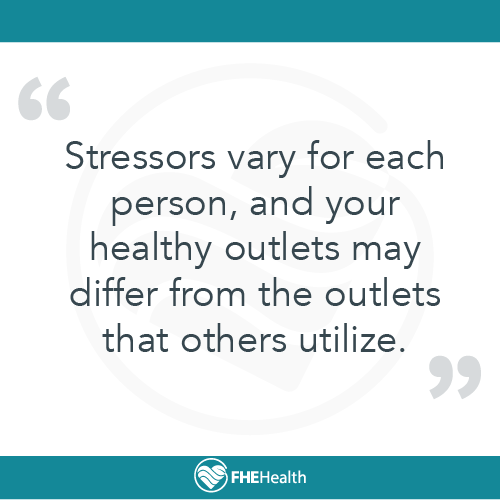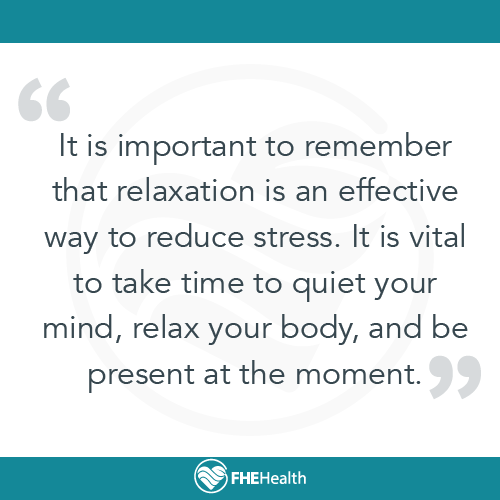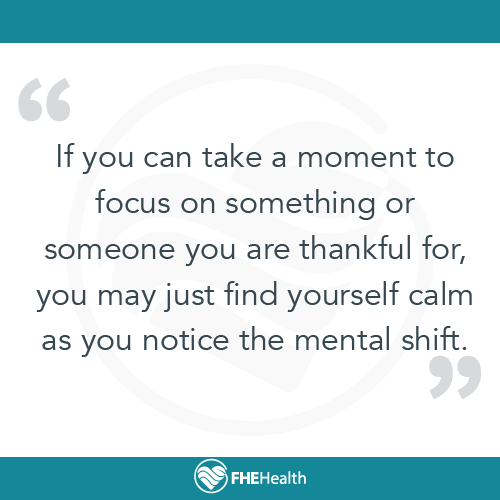
Recovering from drug or alcohol addiction generally includes rebuilding our lives, clearing the wreckage of our past, making amends, and more. Additionally, recovering involves dealing with an unwelcome amount of anxiety and high-stress level. Stress is an unavoidable and natural side-effect of being human, but especially for those of us who make the courageous decision to get sober.
Almost every addict uses substances to escape unwanted emotions and stress. It’s no surprise that we have to face triggers as we trudge the road to recovery. However, because stress is one of the primary triggers of relapse, we must learn how to manage stress. Our FHE Health Connected with Alumni Health Program will help you walk through the challenges of staying sober. Here are five ways I have learned how to manage stress in recovery without resorting to self-medicating with drugs and alcohol.
Practicing Mindfulness
 Mindfulness has become an increasingly popular stress management tool. Keeping up with transparency, when I first heard about mindfulness, I thought it was a complete joke. I envisioned myself attempting to position myself in the lotus position and holding back laughter as I try to recite the ever-popular “OHM” chant. I couldn’t have been more misled.
Mindfulness has become an increasingly popular stress management tool. Keeping up with transparency, when I first heard about mindfulness, I thought it was a complete joke. I envisioned myself attempting to position myself in the lotus position and holding back laughter as I try to recite the ever-popular “OHM” chant. I couldn’t have been more misled.
Mindfulness-based stress reduction (MBSR) has been studied since 1979 and has been proven to be effective. Mindfulness focuses on teaching an individual to be aware of the present moment. “Where are your feet right now?” This simple phrase is so useful in helping an anxious person like me find grounding. Mindfulness can help to reduce cravings, mitigate stress, and deal with stressful situations.
My contempt, prior to investigation, led me astray from a tool that has become a ritual I try to practice daily today. Although mindfulness is a form of meditation, the implementation of this practice is not formal in nature. There is no instructional manual that leads us to the perfect mindfulness practice. Take a second to breathe, notice where your feet are planted, re-shift your focus, and restart your day. I promise you won’t regret it.
Tips to Manage Stress
 Think of the outlets you use on a daily basis to charge your most precious devices. Electricity and energy are transferred from the outlet to the device. Similarly, a stress outlet is something you enjoy to manage stress better. Stressors vary for each person, and your healthy outlets may differ from the outlets that others utilize.
Think of the outlets you use on a daily basis to charge your most precious devices. Electricity and energy are transferred from the outlet to the device. Similarly, a stress outlet is something you enjoy to manage stress better. Stressors vary for each person, and your healthy outlets may differ from the outlets that others utilize.
Ever since I was a little girl, I can always remember my constant need to write when I was feeling stressed or overly emotional. During my many years of active addiction, I failed to recognize the stress management practices I used in my younger years. When I found recovery, I began to make it a goal to start writing again. When I am feeling overwhelmed, stressed, or anxious, my outlet is to put pen to paper and begin to release unhealthy energy.
Many people in recovery find exercise as a great stress outlet. Stimulating blood flow, creating an influx of dopamine and serotonin; exercise is a great way to eliminate stress. Some other examples of healthy outlets for stress are :
- Go for a walk
- Take a hot bath
- Meditate
- Keep a journal
- Practice Yoga & deep breathing
- Cook and eat a healthy meal
- Read a book
- Pick up the phone and call your sober support
Find an activity that requires you to move your feet and refocus your attention on that thing. It is suggested you find an outlet you enjoy to better manage stress.
Eat, Sleep, and Be Well
 Most people in active addiction neglect to take care of their overall health. Many of us eat sparingly, rarely sleep, and avoid dealing with our mental health. Health and stress are connected, and the two work together to maintain overall balance. If you are not exercising and eating poorly, you are more likely to be stressed than if you eat well and exercise.
Most people in active addiction neglect to take care of their overall health. Many of us eat sparingly, rarely sleep, and avoid dealing with our mental health. Health and stress are connected, and the two work together to maintain overall balance. If you are not exercising and eating poorly, you are more likely to be stressed than if you eat well and exercise.
When I came to South Florida, my life was completely unmanageable. I couldn’t successfully maintain anything in my life outside of getting my next fix. I didn’t have much of an appetite for anything other than my drugs and alcohol. I neglected sleep, in fear of missing out. I spent every second of my day self-medicating to suppress all of my emotions and untreated PTSD. My life was an absolute disaster, and my body was anything but alkaline – no wonder I was stressed.
Exercising for More than Just Physical Health
Studies have shown the overall benefits (mentally/physically) of exercising even just 30 minutes a day. Physical activity reduces stress, boosts self-confidence, and improves your mood and sense of self. Quality nutrition can reduce your body’s stress response system.
Exercising your body, or any kind of rigorous activity releases dopamine, serotonin, and endorphins. These are all fancy ways to say that exercise can make you feel good, quickly. In a moment when your stressors have you panicking, maybe try to take a walk, go for a run, get out of town and take a nature hike. Let your body have the movement it’s craving and let your brain relax amid the happy chemicals being released.
Directly attributed to substance abuse, many recovering addicts and alcoholics suffer from co-occurring nutrient disorders. Deficiencies in neurotransmitters like vitamins B6, B12, folate, and Omega fatty acids can increase feelings of anxiety, depression, and elevate your body’s stress response in the nervous system. Eating well and getting adequate sleep can mitigate stress while boosting serotonin and dopamine, ultimately cultivating happiness.
Allow Yourself Time to Relax
Recovering from the seemingly hopeless disease of addiction is difficult — to say the least. Most of us walk into treatment beaten into a state of submission. Grandiose and unrealistic expectations of perfectionism exhaust us. The idea that we must recover perfectly creates a perpetual state of stress and anxiety.
When I was a little girl, it was not acceptable to take a nap during the day. I was frequently told to do chores or play outside. It’s no surprise that this idea followed me long into my late 20’s as I stepped into recovery. In fact, I would sabotage myself by not allowing myself time or space to rest. I couldn’t sit with myself – ever. Three years sober, and with the grace of enough pain, I have learned how important it is to take care of myself.
In recovery, we are striving to clean up the destruction we left behind and aiming to be better versions of ourselves than we were yesterday. This can feel stressful and seemingly overwhelming at times. It is important to remember that relaxation is an effective way to reduce stress. It is vital to take time to quiet your body and mind to be present in the moment.
Find Gratitude
 A daily gratitude practice has been proven to reduce stress and increase overall wellbeing. It is merely impossible to feel stressed out and anxious when you are reflecting on the things you are grateful for. If you can take a moment to focus on something or someone you are thankful for, you may just find yourself calm as you notice the mental shift. An overall positive attitude can be cultivated with a little gratitude practice.
A daily gratitude practice has been proven to reduce stress and increase overall wellbeing. It is merely impossible to feel stressed out and anxious when you are reflecting on the things you are grateful for. If you can take a moment to focus on something or someone you are thankful for, you may just find yourself calm as you notice the mental shift. An overall positive attitude can be cultivated with a little gratitude practice.
Gratitude and stress cannot coexist. I was told, early in sobriety, that I needed to take the time to reflect on the things I am presently grateful for. At first, I considered the exercise to be a cheesy summer camp ritual that had been incorporated into recovery as a method of torturing me. Today, I send a gratitude list to 10 women (including my sponsor) in a chain text every night. Spending time to reflect on the things I am grateful for while reading the gratitude list of the women I love the most, has revolutionized my recovery. My entire perception has shifted, and I couldn’t be more grateful.
If you learn anything about coping with stress, always have a plan and keep track of what works for you. Know what you are going to do before stress hits you. Keep ideas in your back pocket for when you need a good and effective stress reliever. This will help you manage triggers and cravings and will keep you on the path to a life lived in sobriety.
Take our Coping and Stress Management Test today and get in touch with our rehab specialists by calling (866) 809-8164.






